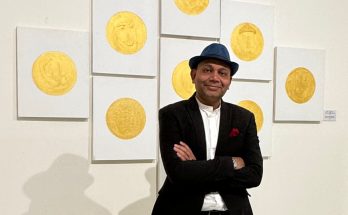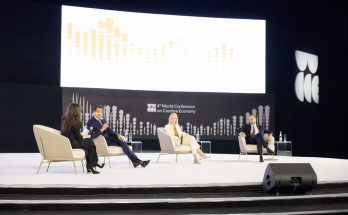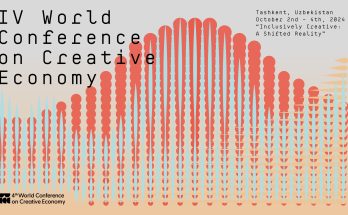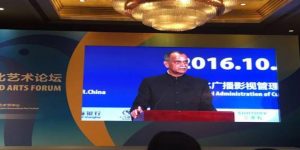 Politics divides, culture connects. Just a couple of days before Chinese President Xi Jinping and Prime Minister Narendra Modi met in Goa to discuss weighty issues such as India’s NSG membership, the two Asian giants quietly turned to the magic of films to make their ties hum with positive energy. In Shanghai, a pact was signed between India and China to recreate Raj Kapoor’s 1951 classic Awaara into a contemporary Chinese opera.
Politics divides, culture connects. Just a couple of days before Chinese President Xi Jinping and Prime Minister Narendra Modi met in Goa to discuss weighty issues such as India’s NSG membership, the two Asian giants quietly turned to the magic of films to make their ties hum with positive energy. In Shanghai, a pact was signed between India and China to recreate Raj Kapoor’s 1951 classic Awaara into a contemporary Chinese opera.
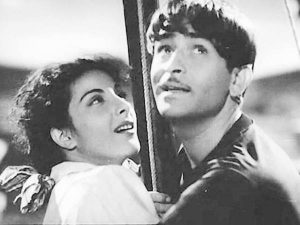 Amarendra Khatua, the new director-general of Indian Council for Cultural Relations (ICCR), who was in Shanghai to deliver the keynote address at the 18th China Shanghai International Arts Festival (CSIAF), struck an upbeat note on long-standing civilisational ties and promoting cultural exchanges in Tier-II and Tier-III cities in India and China. The joint theatrical remake of Awaara, which remains the most popular Indian movie in China, hints at more such collaborative cultural tie-ups India is set to pursue in days to come.
Amarendra Khatua, the new director-general of Indian Council for Cultural Relations (ICCR), who was in Shanghai to deliver the keynote address at the 18th China Shanghai International Arts Festival (CSIAF), struck an upbeat note on long-standing civilisational ties and promoting cultural exchanges in Tier-II and Tier-III cities in India and China. The joint theatrical remake of Awaara, which remains the most popular Indian movie in China, hints at more such collaborative cultural tie-ups India is set to pursue in days to come.
“Cultural diplomacy is poised to play a bigger role in India’s foreign policy calculus in days and months to come and promote Brand India,” said Khatua, a veteran diplomat and an accomplished poet who writes and translates in English, Hindi and other Indian languages.
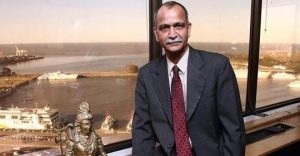 With the Modi government positioning culture at the heart of India’s burgeoning diplomatic engagements, Khatua has been given a focused brief. “Both Prime Minister Narendra Modi and EAM Sushma Swaraj want a streamlined, transparent and efficient working of ICCR,” he told India Writes Network in an interview at his tastefully done office in Azad Bhavan, the seat of India’s cultural diplomacy.
With the Modi government positioning culture at the heart of India’s burgeoning diplomatic engagements, Khatua has been given a focused brief. “Both Prime Minister Narendra Modi and EAM Sushma Swaraj want a streamlined, transparent and efficient working of ICCR,” he told India Writes Network in an interview at his tastefully done office in Azad Bhavan, the seat of India’s cultural diplomacy.
In barely three weeks since he has been at the helm of the ICCR, Khatua is doing precisely this: fixing the system, motivating the bureaucracy and staff, and interacting with a diverse spectrum of performers, musicians, dancers, sculptures and creative professionals.
Focus on Brand India
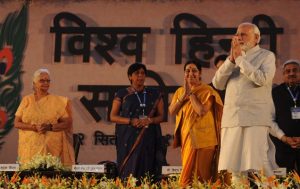 Amid all this frenzy, Khatua is calm and clear about the ICCR’s priorities. “The focus will be on promoting and showcasing diaspora linkages, propagation of yoga and ayurveda, including pharmacopeia of Ayurveda,” he said.
Amid all this frenzy, Khatua is calm and clear about the ICCR’s priorities. “The focus will be on promoting and showcasing diaspora linkages, propagation of yoga and ayurveda, including pharmacopeia of Ayurveda,” he said.
“ICCR will work closely with territorial divisions of the MEA to organise appropriate cultural activities. In general, there will be a greater involvement of ICCR in diplomatic activities across the spectrum,” he said.
“Under the new leadership, we are making efforts to promote ‘Brand India’ through emphasis on traditional Indian cultural and scientific mores, yoga, Ayurveda, Sanskrit, Vedas, folk arts and culture, Puranic and historic cultural and philosophical linkages between India and the world,” he said. The promotion of Hindi and greater cultural footprints in Africa, Latin America and neighbouring countries are important priorities, he added.
The Way Ahead
Looking ahead, Mr Khatua said that the ICCR will be setting up more cultural centres. Currently, there are 26 cultural centres set up by India across continents. “The aim is to have 50 cultural centres in the next 15 years,” he said. Another important priority will be to take two-way cultural diplomacy to second and three tier cities, he said.
 Khatua, the author of several critically acclaimed collections of poems, including “Garden of Enchanted Stones,” is a firm believer in the power of culture to connect nations and peoples. “Promotion of soft power adds up to all our diplomatic initiatives as cultural inputs improve people-to-people contact, continuing interaction, academic and other ideas exchange and brand image,” he said.
Khatua, the author of several critically acclaimed collections of poems, including “Garden of Enchanted Stones,” is a firm believer in the power of culture to connect nations and peoples. “Promotion of soft power adds up to all our diplomatic initiatives as cultural inputs improve people-to-people contact, continuing interaction, academic and other ideas exchange and brand image,” he said.
The last two years have seen culture moving to the centre-stage of India’s diplomatic outreach, with Indian cultural values and traditions striking a chord across the world. In a landmark achievement, the UN unanimously adopted a resolution declaring June 21 as the International Yoga Day following an inspirational address by Prime Minister Narendra Modi at the United Nations General Assembly in September 2014. Since then, the Yoga Day has been celebrated with passion and panache across key world capitals.
Author Profile

- Manish Chand is Founder-CEO and Editor-in-Chief of India Writes Network (www.indiawrites.org) and India and World, a pioneering magazine focused on international affairs. He is CEO/Director of TGII Media Private Limited, an India-based media, publishing, research and consultancy company.
Latest entries
 India and the WorldApril 21, 20253T Template for India-US Mega Partnership
India and the WorldApril 21, 20253T Template for India-US Mega Partnership India and the WorldFebruary 14, 2025Modi-Trump COMPACT: India, US launch MEGA partnership for 21st century
India and the WorldFebruary 14, 2025Modi-Trump COMPACT: India, US launch MEGA partnership for 21st century India and the WorldJanuary 28, 2025Modi, Trump talk global peace, focus on strategic connect
India and the WorldJanuary 28, 2025Modi, Trump talk global peace, focus on strategic connect India and the WorldDecember 16, 2024Kazan Spirit: India, China SRs to hold talks in Beijing
India and the WorldDecember 16, 2024Kazan Spirit: India, China SRs to hold talks in Beijing





